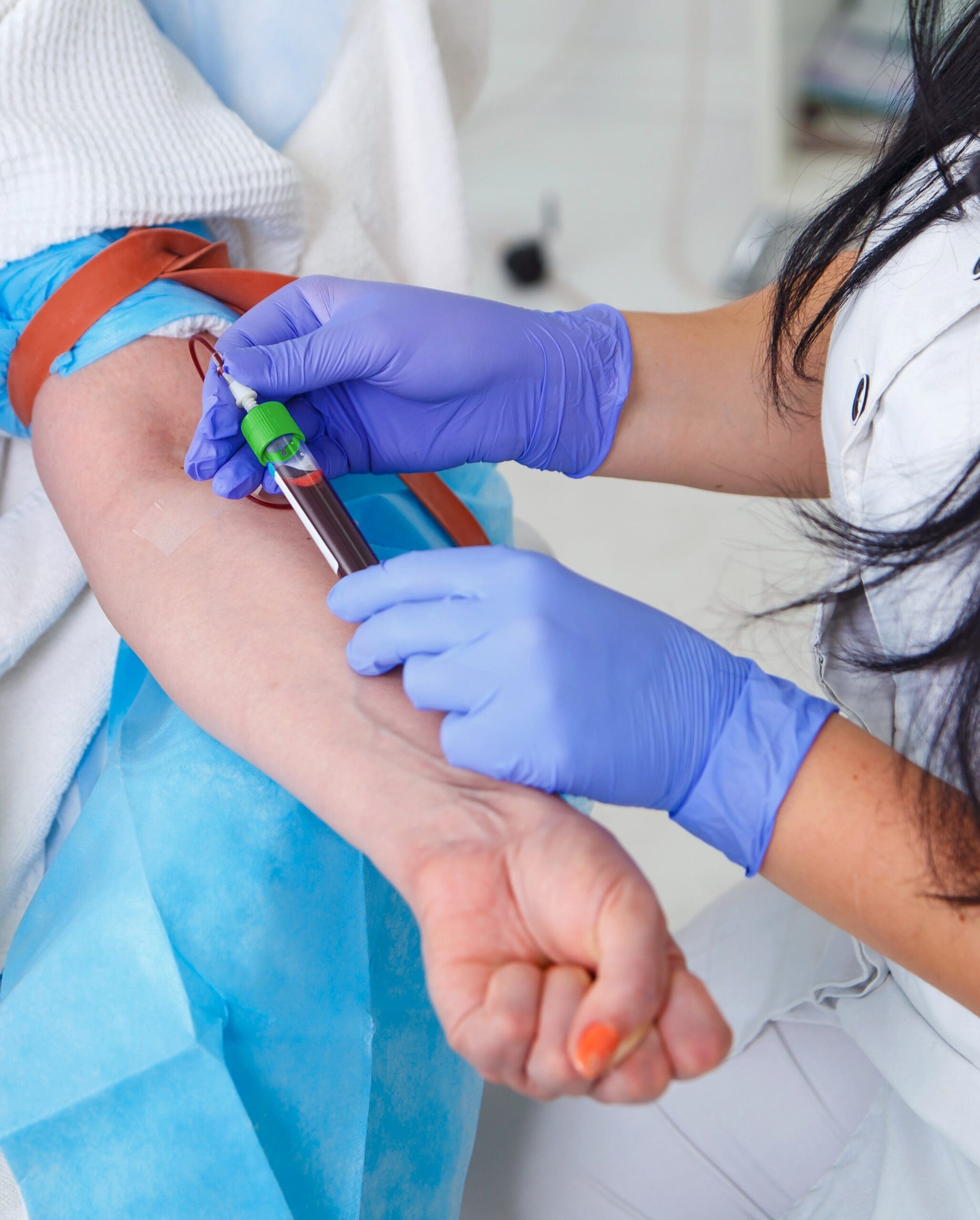What qualifications do I need to be a Phlebotomist?
Everything about the qualifications you need to become a Phlebotomist
Choosing to become a phlebotomist is a decision that opens the door to a rewarding and impactful career in the healthcare sector. As a phlebotomist, you play a crucial role in patient care, being responsible for drawing blood samples that are essential for diagnosing and treating various medical conditions. This profession not only offers job stability but also provides an opportunity to make a real difference in people’s lives every day.
The path to becoming a phlebotomist is both accessible and fulfilling. With comprehensive training programmes available across the UK, aspiring individuals can quickly gain the skills required to excel in this field. These programmes cover everything from anatomy and physiology to mastering the art of venipuncture with precision and care.
Moreover, working as a phlebotomist allows you to interact closely with patients, often providing them with comfort during what can be an anxious time. Your ability to offer reassurance and professionalism can significantly enhance their experience within the healthcare system.
In addition, this role offers flexibility and diverse opportunities within hospitals, clinics, or even mobile units – a variety of settings where your expertise will be valued. For those looking for career progression, gaining experience as a phlebotomist can also serve as an excellent stepping stone into other healthcare roles.
Ultimately, choosing this path means committing yourself to lifelong learning and compassionate patient care – qualities that are highly prized within any medical environment. If you’re ready for an engaging career where your contributions truly matter, becoming a phlebotomist might just be your perfect fit.
In this Phlebotomist qualifications guide
Qualifications to be a Phlebotomist
Embarking on a career as a phlebotomist is an excellent choice for those with a keen interest in healthcare and patient interaction. As the demand for skilled healthcare professionals continues to rise, phlebotomy offers a rewarding pathway into the medical field without the extensive training required for other roles. To become a qualified phlebotomist in the UK, you will need to complete specific training programmes that equip you with both theoretical knowledge and practical skills. These qualifications ensure that you are proficient in safely drawing blood samples, handling specimens correctly, and providing compassionate care to patients during procedures.
The journey typically begins with obtaining a recognised qualification such as the Level 3 Diploma in Phlebotomy or equivalent certification through accredited courses. These educational programmes cover essential topics like anatomy, infection control, and health and safety regulations. Moreover, they provide hands-on experience under supervision so that by the time you qualify, you’re well-prepared to step into your role confidently.
In addition to formal qualifications, successful phlebotomists often possess excellent communication skills and a reassuring bedside manner – qualities that help ease patient anxieties during blood collection. With these attributes combined with your technical expertise gained through training, you’ll be set to make meaningful contributions within clinical settings. Whether working in hospitals, GP surgeries or private clinics, being a phlebotomist is not just about collecting samples; it’s about making every patient’s experience as comfortable as possible while supporting vital diagnostic processes within healthcare teams across the UK.
What qualifications are needed to be a Phlebotomist?
If you’re considering a career as a phlebotomist in the UK, it’s important to understand the qualifications required at each level and the roles and responsibilities associated with them. Phlebotomy is a critical role within healthcare, ensuring that blood samples are collected safely and efficiently for testing and diagnosis.
Level 2 Phlebotomist Qualifications
At Level 2, aspiring phlebotomists typically begin with an introductory course or on-the-job training. This level focuses on basic skills such as understanding health and safety protocols, patient interaction, and initial blood collection techniques. A Level 2 qualification is often sufficient for entry-level positions where you will be supervised by more experienced staff.
Level 3 Phlebotomist Qualifications
Progressing to Level 3 involves undertaking more comprehensive training, often through accredited courses that cover advanced techniques in venepuncture, anatomy, physiology related to blood collection, and infection control. At this stage, phlebotomists are expected to work more independently while still under some supervision. They may also take on additional responsibilities like mentoring new trainees or managing equipment.
Level 4 Phlebotomist Qualifications
Level 4 represents a higher tier of expertise where phlebotomists might specialise further or take on leadership roles within their department. Qualifications at this level often require additional study or vocational training focused on complex procedures and patient care management. Phlebotomists at this stage may oversee entire teams, ensure compliance with regulations across their unit, or engage in quality control processes.
Each level builds upon the previous one not just in terms of technical skill but also responsibility towards patient care and departmental operations. By understanding these distinctions clearly, you can make informed decisions about your career path in phlebotomy while contributing effectively to the healthcare system’s success.

Professional bodies for a Phlebotomist
Joining a professional body can be a significant step for any phlebotomist looking to advance their career, stay updated with the latest industry standards, and connect with like-minded professionals. In the UK, there are several esteemed organisations that cater specifically to phlebotomists.
One notable association is the National Association of Phlebotomists (NAP). This organisation offers its members access to a wealth of resources, including training opportunities and professional development courses. Being part of NAP not only enhances your skills but also ensures you are up-to-date with current practices and legislative changes in the field.
Another key body is the Institute of Biomedical Science (IBMS), which, while catering to a broader range of biomedical professionals, provides valuable resources for those in phlebotomy. Membership with IBMS can offer networking opportunities and access to conferences that can enrich your understanding and expertise.
The British Society for Haematology (BSH) is also worth considering. While it primarily focuses on haematology as a whole, its insights into blood sciences make it highly relevant for phlebotomists seeking deeper knowledge about their practice area.
By joining these professional bodies, phlebotomists not only enhance their credentials but also gain access to an invaluable support network that fosters both personal and professional growth.
Training fees to become a Phlebotomist
When considering a career as a phlebotomist, understanding the costs associated with training is crucial. The fees for phlebotomy courses can vary depending on the level of qualification you pursue – be it Level 2, Level 3, or Level 4.
For those starting at Level 2, the training fees typically range from £300 to £600. This level covers the basics and is ideal for individuals new to healthcare or looking to add phlebotomy skills to their existing qualifications.
Progressing to Level 3, expect to pay between £600 and £1,000. This intermediate level provides more in-depth knowledge and practical skills necessary for more advanced roles within phlebotomy.
Finally, at Level 4, which often includes specialised techniques and leadership training within the field of phlebotomy, fees can range from £1,000 upwards. While this represents a significant investment in your education and future career prospects, it also opens doors to higher-level positions that come with increased responsibilities and potential earnings.
Investing in these courses is not only about gaining certification but also about securing a stable career path in healthcare with numerous opportunities for growth.

Getting experience to be a Phlebotomist
Becoming a phlebotomist is a rewarding career choice, and gaining relevant experience is crucial to your success in this field. One of the most effective ways to acquire practical skills is through hands-on training, which can often be found in healthcare settings such as hospitals, clinics, or blood donation centres. Volunteering at these facilities not only provides you with invaluable experience but also allows you to build professional relationships that could lead to future employment opportunities.
Enrolling in a certified phlebotomy training programme is another essential step. These programmes offer comprehensive instruction on blood collection techniques, safety protocols, and patient interaction skills. They often include supervised clinical practice sessions where you can apply what you’ve learned in real-world situations.
Networking with current professionals in the field can also provide insights and advice on how to advance your career. Attending workshops or joining professional organisations related to phlebotomy can help you stay updated on industry trends and best practices.
Remember, every bit of experience counts towards becoming a competent phlebotomist. By actively seeking out opportunities for learning and growth, you’ll be well-equipped for this vital role within the healthcare sector.



